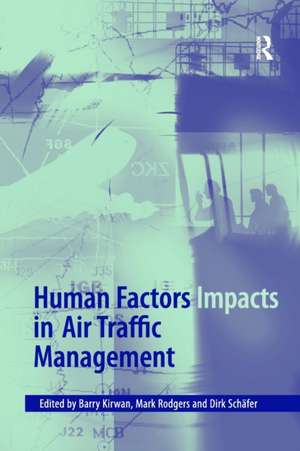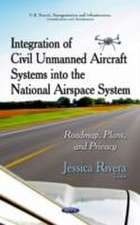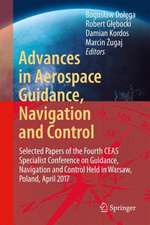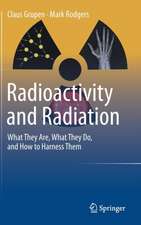Human Factors Impacts in Air Traffic Management
Autor Mark Rodgers Editat de Barry Kirwanen Limba Engleză Paperback – 15 noi 2016
| Toate formatele și edițiile | Preț | Express |
|---|---|---|
| Paperback (1) | 387.31 lei 3-5 săpt. | +34.51 lei 4-10 zile |
| CRC Press – 15 noi 2016 | 387.31 lei 3-5 săpt. | +34.51 lei 4-10 zile |
| Hardback (1) | 1117.60 lei 6-8 săpt. | |
| CRC Press – 28 oct 2005 | 1117.60 lei 6-8 săpt. |
Preț: 387.31 lei
Preț vechi: 421.00 lei
-8% Nou
Puncte Express: 581
Preț estimativ în valută:
74.12€ • 77.22$ • 61.63£
74.12€ • 77.22$ • 61.63£
Carte disponibilă
Livrare economică 21 ianuarie-04 februarie 25
Livrare express 04-10 ianuarie 25 pentru 44.50 lei
Preluare comenzi: 021 569.72.76
Specificații
ISBN-13: 9781138264311
ISBN-10: 1138264318
Pagini: 584
Dimensiuni: 156 x 234 x 35 mm
Greutate: 0.84 kg
Ediția:1
Editura: CRC Press
Colecția Routledge
ISBN-10: 1138264318
Pagini: 584
Dimensiuni: 156 x 234 x 35 mm
Greutate: 0.84 kg
Ediția:1
Editura: CRC Press
Colecția Routledge
Cuprins
Contents: Introduction: Introduction. Human Factors In Operations: Development and implementation of a position hand-over checklist and best practice process for air traffic controllers, Laura Voller, Lucy Glasgow, Nicky Heath, Richard Kennedy and Richard Mason; Runway safety, Kim M. Cardosi; Human error in European air traffic management: from theory to practice, Anne Isaac, Paul Engelen and Martin Polman; FAA strategies for reducing operational error causal factors, Julia Pounds and Anthony S. Ferrante; Reducing separation in the open flight information region: insights into a human factors safety case, Barry Kirwan, Steven Shorrock, Richard Scaife and Paul Fearnside; Distributed work in the national airspace system: providing feedback loops using the post-operations evaluation tool (POET), Philip J. Smith, Mark Klopfenstein, Joe Jezerinac and Amy Spencer. Human Factors and Human Resources: Human factors longitudinal study to support the improvement of air traffic controller training, Laura Voller and Abigail Fowler; A singular success: air traffic control specialist selection 1981-1992, Dana Broach; Implementation of critical incident stress management at German air navigation services, Jörg Leonhardt; Team resource management in European air traffic control: results of a seven-year development and implementation program, Michiel Woldring, Dominique Van Damme, Ian Patterson and PatrÃcia Henriques; Shiftwork and air traffic control: transitioning research results to the workforce, Pamela S. Della Rocco and Thomas E. Nesthus. Human Factors Methodologies: Measuring air traffic controller performance in the 21st century, Carol Manning and Earl Stein; Computational human performance models and air traffic management, Kevin Corker; Performance prediction in air traffic management: applying human error analysis approaches to new concepts, Steven Shorrock, Barry Kirwan and Ed Smith. Human Factors Integration Programs: The management of human factors programs in ATM a
Notă biografică
Dr Barry Kirwan is currently working in the field of System Safety and Human Error for Eurocontrol in Bretigny, France. Formerly Head of Human Factors in NATS, UK, he has led a large programme of work from 1996-2000 which had a significant impact in the ATM industry. Mark Rodgers is the FAA Chief Scientific and Technical Advisor for Human Factors. Dr Rodgers received his Ph.D. in Experimental Psychology from the University of Louisville in 1991. Dr Schäfer is Human Factors Expert at the Eurocontrol Experimental Centre in Bretigny where he is responsible for human factors experiments and projects.
Recenzii
’With more than 40 contributors lending their expertise, Human Factors in Air Traffic Management is a definitive work in the field and important reading for students, educators and supervisors as well.’ Collegiate Aviation News 'This book provides a comprehensive and up to date overview of important Human Factors aspects on Air Traffic Management and should be of use for practitioners as well as scientists.' Human Factors and Ergonomics Safety Newsletter. 2006 'Overall, Human Factors Impacts in Air Traffic Management is an important addition to the aviation industry literature and can be used to communicate how human factors can bring additional benefits across the industry in terms of operations, human resources, performance measurement and integration into organisations as a better way of doing business.' - Journal of Airport Management, Jan - Mar 2007 'Human Factors Impacts in Air Traffic Management sets out to demonstrate by reference to evidence arising from actual initiatives, programmes and activities, the quantitative and qualitative beneftis that can accrue from the adoption and integration human factors into all aspects and all stages of air traffic management. In this endeavour, its 21 informative chapters fully succeed.' Mike Burlyn, Aerospace Professional, January 2007
Descriere
This book provides case studies including training methods, human error, team resource management, situation assessment, terminal automation replacement systems, collaborative decision-making to improve the effectiveness of traffic-flow management and the role of human factors in ATM. It outlines how human factors study evolved, what it entailed, how it was resourced and how results have contributed to operational performance.










